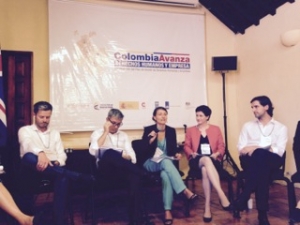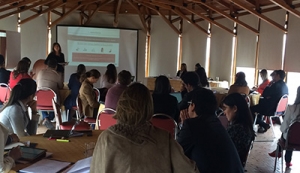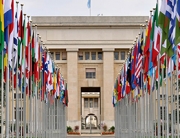Project Description
On 26 November the Investment & Human Rights Project (IHRP) issued its recommendations to the government of Colombia to address investment policy in its National Action Plan on Business and Human Rights (NAP). The recommendations are part of the IHRP’s work to support the implementation of the UN Guiding Principles on Business and Human Rights State Duty to Protect (DtP) and improve guidance available to States on foreign direct investment and investment policy in the development of NAPs.
Colombia and the NAP

IHRP’s Andrea Saldarriaga providing public comments on the draft Colombian NAP in Cartagena, Colombia
The Presidential Advisory Office for Human Rights (PAOHR) is leading the preparation of the NAP in Colombia. The NAP follows on a number of the efforts by the Colombian government to implement the UN Guiding Principles on Business and Human Rights (UNGPs), including the July 2014 publication of the Guidelines for Public Policy on Business and Human Rights.
The process to build the NAP began in early 2015 with the creation of a Technical Advisory Committee made up of delegates from the Ministries responsible for the joint construction of the Plan under the leadership of the PAOHR. The construction of the NAP has included meetings with companies, civil society organisations and government entities. Various governments and international organisations have also taken part in the process. The PAOHR aims to adopt the NAP before the end of the year.
The NAP comes at a crucial time for Colombia, as the signature of the final peace agreement between the government and the guerrilla group FARC is planned for 23 March 2016. The announcement of the final peace agreement has created great expectations for the reparation of victims of the conflict that has ravaged Colombia for decades. At the same time, it is crucial for the government to regain people’s trust in its capacity and willingness to ensure the respect for, protection and fulfilment of human rights in the country. Ensuring that businesses respect human rights should be a key component of the government’s post-conflict efforts.
The Colombian government is counting on foreign direct investment (FDI) as a vehicle for economic development and is hoping that the private sector – including foreign investors – will play a significant role in financing post-conflict efforts. There is therefore an urgent need to guarantee that Colombia attracts the right kind of investors: those that are aware of the challenges that a post-conflict situation might pose, that are ready to ensure their activities do not create obstacles to peace building, and those whose business activities can help Colombia pursue its post-conflict policy and economic goals.
Embedding the protection of human rights into the full range of State policies and practices that support, facilitate, promote and regulate investment should thus be a key dimension for the Colombian government to consider when implementing its DtP.
Developing the recommendations on investment for the NAP
To develop its recommendations, the IHRP organised a series of events in Bogota on 26, 28 and 29 October. These events included a workshop with nearly 40 government officials working on investment in different ministries and agencies (including the ministry of mines, trade, environment, foreign affairs, the mining agency, the national planning department and others). The workshop covered investment policy and human rights, focusing on the State’s DtP. It offered an opportunity for the participants to bring up key issues and challenges related to human rights and investment in the Colombian context.
The IHRP also held a series of dialogues with the private sector, civil society, academia, foreign governments and international organisations present in Colombia to gather their views on the challenges, concerns and priorities relating to investment and human rights in the context of Colombia.
The recommendations that the IHRP has submitted consider the specificities of the Colombian context – including the post-conflict scenario – and the issues identified by the various stakeholders as priorities.
Summary of the recommendations on investment for the NAP
Given the tight schedule for adoption of the NAP, the IHRP did not make recommendations addressing any structural or procedural concerns in the NAP process itself. The recommendations focus on achievable, practical steps that can be integrated into the NAP at this advanced stage.
The IHRP recommended three activities that could be included in the NAP to be undertaken as first steps towards the construction of a regime of foreign investment that fully integrates respect for human rights:
- Drive an inter-institutional and multi-stakeholder dialogue to build an investment policy that serves the needs of Colombia’s post-conflict efforts, including ensuring respect for human rights in the context of investment.
- Conduct a review of the regulatory framework, including laws, State-investor contracts and international investment treaties, to ensure that the State retains its capacity to meet its human rights obligations.
- Conduct a review of the regulatory and institutional framework in priority sectors for FDI regarding if and how the State identifies human rights risks posed by investment and how it ensures the management of such human rights risks.
In addition, the IHRP made specific recommendations relating to existing provisions of the draft NAP released on 27 October 2015. These recommendations include actions to favour the integration of human rights risk management across investment-related government activities.
The full text of the analysis and recommendations in Spanish can be accessed here.











